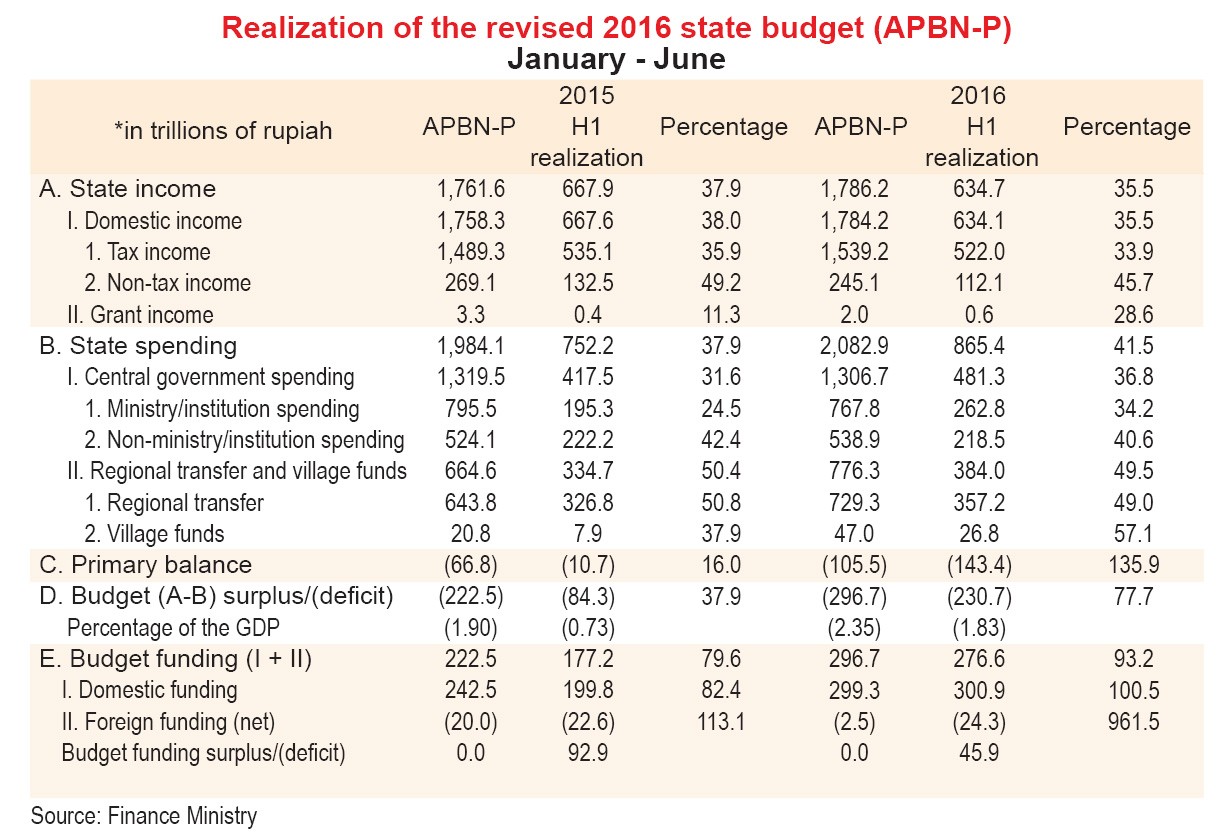Popular Reads
Top Results
Can't find what you're looking for?
View all search resultsPopular Reads
Top Results
Can't find what you're looking for?
View all search resultsBudget cut spillover looms
Change text size
Gift Premium Articles
to Anyone
W
hile announcing a second round of cuts to this year’s state budget, Sri Mulyani Indrawati, installed as finance minister only a week ago, has given an assurance the austerity measures will not affect state spending priorities such as infrastructure and social assistance expenditure.
However, the reality may not be as conducive. The government’s fiscal space is so narrow that even when operational and non-productive spending — such as on trips and meetings — is cut, productive expenditure may still need to be axed, said Indonesian Institute of Sciences (LIPI) economist Latif Adam.
“I suspect the government will also reduce its capital expenditure,” Latif said. “It’s highly possible that some development programs will face postponement.”
President Joko “Jokowi” Widodo, who called on Wednesday for ministries and state institutions to be “disciplined in making savings in expenditure”, has given his blessing to Sri Mulyani to slash over Rp 133 trillion (US$10.1 billion) off the revised 2016 state budget as the tax shortfall is expected to hit Rp 219 trillion.
As a result of the shortfall the fiscal deficit could soar to 2.5 percent of the country’s gross domestic product (GDP), nearing the legally permissible level of 3 percent, and in comparison with the initial forecast of 2.35 percent.
“I’m sure the state budget can still stimulate the economy because the cuts will not happen to infrastructure and already signed deals will not be disrupted,” said Sri Mulyani, former World Bank managing director, regarded widely as a neoliberal economist.
Jokowi, known for his populist image, has put infrastructure at the top of his priority list as he aims to stoke growth in the country, which has seen economic growth slumping to the lowest level in six years in 2015. But his ambitious tax targets have their taken toll on this agenda.
Government spending for ministries and institutions had already been cut by Rp 16.3 trillion in the revised 2016 state budget, passed into law at the end of June, when tax collection had only reached a third of the full-year target despite being halfway through the year.
Those cuts, which were much lower than the latest planned Rp 133 trillion, translated into ministries responsible for infrastructure construction, such as the Public Works and Public Housing Ministry and Transportation Ministry, putting several of their projects on hold.
Some national strategic railway projects have been affected, including the Madiun-Kedungbanteng double-track project in East Java, which is a part of the trans-Java railway project, and the Makassar-Parepare railway construction in South Sulawesi, part of the trans-Sulawesi project.
Other projects include port facilities in Tanjung Mocoh, Riau, and Labuhan Angin, Medan, North Sumatra, as well as a lighthouse in Ambon, Maluku.
Samuel Asset Management economist Lana Soelistianingsih said the cash-strapped budget had affected several construction companies as they were already experiencing payment delays from the government. The delays have multiplied to affect the companies’ business partners, such as material suppliers and subcontract workers, she added.
Publicly listed firm Surya Semesta Internusa, involved in construction, industrial estates and hotels, expects construction projects from the government to decline, while its hotel business will be affected by fewer meetings and working trips.
“This situation has led to state-run construction companies bidding for private-sector projects, causing fiercer competition with private firms,” said the firm’s investor relations officer Erlin Budiman.
Meanwhile, with regard to its industrial estate business Erlin said the effect would not be significant because its clients were mostly private-sector manufacturers and consumer goods firms.
Department store firm Ramayana Lestari Sentosa director Suryanto said the cuts would only affect the retail industry if the unemployment rate started to increase.
Bahana Securities research head Harry Su, who feels the budget cuts are an important factor in creating a more credible state budget, said that the adverse effects of the cuts could be contained if the central bank joined forces by easing its monetary policy.
“We hope there will be interest rate cuts by Bank Indonesia [BI] to prop up growth,” he said. The central bank has cut its benchmark BI rate by 100 basis points so far this year to 6.5 percent at present in a bid to stoke growth in Southeast Asia’s largest economy.
Member of House of Representatives Commission XI overseeing financial affairs Mukhamad Misbakhun, a Golkar Party politician, said the government would need to propose a second revision of the 2016 state budget in order to formulate its new budget plans but cautioned against overly severe cutbacks.
“With budget cuts, economic contraction will occur, as government spending is slashed and purchasing power drops. It will automatically lead to a slowdown,” he added.
______________________________
To receive comprehensive and earlier access to The Jakarta Post print edition, please subscribe to our epaper through iOS' iTunes, Android's Google Play, Blackberry World or Microsoft's Windows Store. Subscription includes free daily editions of The Nation, The Star Malaysia, the Philippine Daily Inquirer and Asia News.
For print subscription, please contact our call center at (+6221) 5360014 or subscription@thejakartapost.com










